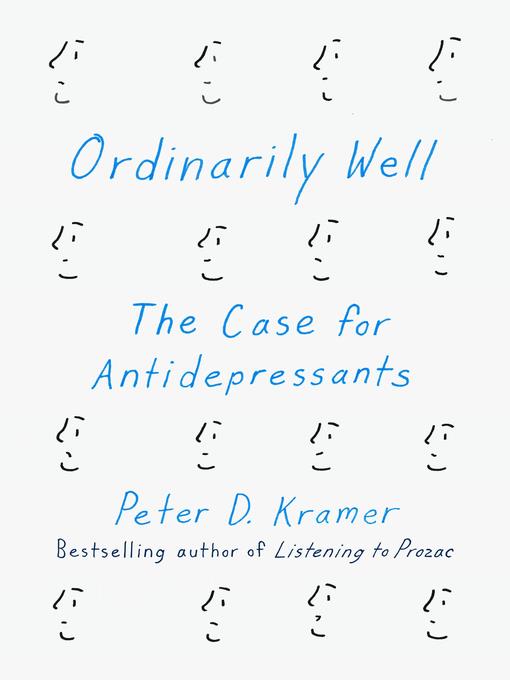
Ordinarily Well
The Case for Antidepressants
کتاب های مرتبط
- اطلاعات
- نقد و بررسی
- دیدگاه کاربران
نقد و بررسی

April 4, 2016
Kramer (Listening to Prozac), a psychiatrist and professor at Brown Medical School, makes an energetic and personal case for the role of antidepressants in easing crippling depression. Starting with the history of psychotherapy, when “infinite patience was the norm” in treatment for depression, Kramer delves into the breakthrough use of imipramine for treatment in the mid-1950s that helped “redefine the disorder” and “invigorate” psychopharmacology. But Kramer’s more captivating story is about the resistance to antidepressants that emerged in the 1970s and was further stoked by Irving Kirsch’s 1998 essay, “Listening to Prozac but Hearing Placebo,” which took direct aim at Kramer’s work. Kramer also takes on the imperfect system of rating a drug’s efficacy, the placebo effect controversy (a “minor element,” he asserts), “cosmetic psychopharmacology,” and the use of antidepressants even after a bout of the illness is resolved. Kramer’s work is data-dense—this is ”the most technical of books,” he concedes. And while there’s a plaintive quality to his arguments, there is also real hope: “Practicing doctors witness antidepressants’ efficacy daily, and the formal evidence supporting those observations is ample.” Kramer shows that the tools may be imperfect, but people battling severe depression are “ lucky to have them.” Agency: Wylie Agency.

April 15, 2016
The 1993 publication of Kramer's Listening to Prozac set off a controversy about the use of mind-altering drugs in the treatment of mental illness that has still to be resolved, a situation the author finds deplorable. Now, almost a quarter century later, Kramer (Brown Medical School; Freud: Inventor of the Modern Mind, 2006, etc.) explains that he had not intended to debunk the value of antidepressants in the treatment of depression. His book not only became a bestseller, turning him into a minor celebrity, but its catchy title was used in broadsided attacks on antidepressants with which he did not agree--e.g., a 1998 article called "Listening to Prozac but Hearing Placebo." The author's concern had been the possibility that the drugs' mind-altering side effects might be used "to tweak" personality--though he admits to having enjoyed the celebrity status that came with the book's publication. In his own psychiatric practice, Kramer finds that psychotherapy and antidepressants both have important roles to play in combating depression. The interplay between them is the subject of an ongoing discussion between himself and his patients as they jointly evaluate the success of treatment. "This book is about two influences on medical practice," he writes, "rigorous trials and clinical encounters." Kramer worries that overemphasis on rigorous trials and statistical analysis of outcomes is eroding the doctor-patient relationship, not allowing for a more flexible, case-by-case approach to treatment. "A tiny fraction of what doctors do finds direct representation in research," he writes. While the efficacy of antidepressants combined with psychotherapy is well-established, how long to maintain their use following recovery is still under debate. It is a question of achieving a balance between preventing the recurrence of depression and side effects such as the occurrence of cataracts and lowered calcium absorption. Written with the compassion, verve, and style that are the author's trademark, this book offers an invaluable overview on the state of treatment and the options available.
COPYRIGHT(2016) Kirkus Reviews, ALL RIGHTS RESERVED.

Starred review from April 15, 2016
Attacks on antidepressants are not new, writes psychiatrist Kramer, a best-selling author whose books include the landmark Listening to Prozac (1993). The latest charge is that antidepressant medicines are nothing more than ennobled placebo pills. Kramer mounts a comprehensive, spirited, and completely convincing defense, dispelling any doubts about their efficacy and life-changing capability. Not only do antidepressants work, they work quite well. He is impressed with the tolerability of SSRI (selective serotonin reuptake inhibitor) medications, including Prozac and Zoloft, and the bonus effects, such as feeling better than well, they confer. Two major influences on the way doctors practice medicine are their own clinical experience (encounters with patients) and precise science (research trials). Since practicing physicians behold the benefits of antidepressants daily, Kramer maintains that any controversy over antidepressants pivots on how randomized drug trials are interpreted. Much of his book explores the deficiencies of these research trials and the faulty analysis of data. For example, some trials enroll atypical groups of people or improperly assign randomization. Kramer is at his best when he reflects on the privilege of being a psychiatrist, the value of a doctor's steady judgement, and the vulnerability of physician and patient alike. He is unwavering: Placebos don't prevent depression, and antidepressants do. Case closed. HIGH-DEMAND BACKSTORY: When Kramer discusses antidepressants people pay attention, guaranteeing wide media coverage of his latest authoritative work.(Reprinted with permission of Booklist, copyright 2016, American Library Association.)

























دیدگاه کاربران